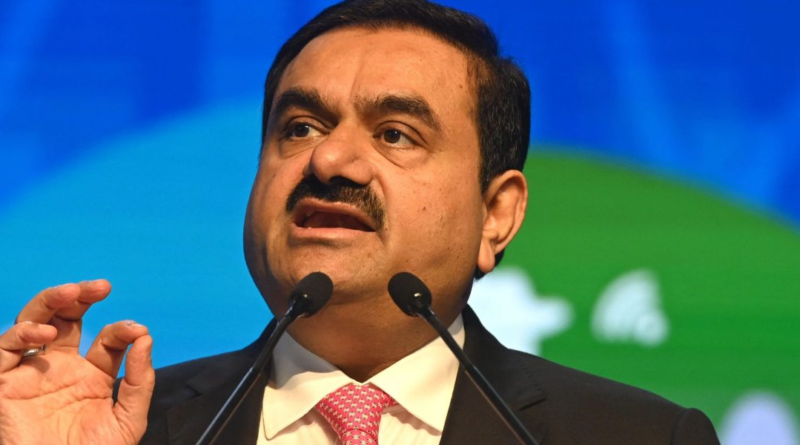Adani accuses Hindenburg of ‘calculated securities fraud’ but India’s status as an emerging-market star comes under Wall Street scrutiny
The start of 2023 was meant to be India’s. The nation’s fast-growing economy and rapidly expanding equity markets had convinced money managers from Morgan Stanley Investment Management to State Street Global Advisors to call it a top investment destination.
Then came the $50 billion selloff in billionaire Gautam Adani’s corporate empire.
It’s a shock that forces Wall Street to reexamine its confidence on India’s expansion and its pro-business government, which helped the benchmark Sensex index trade last quarter at the highest in a decade versus the S&P 500. Those already-lofty valuations — combined with a scathing New York short-seller report attacking Adani Group — spotlights the contradictions within India’s runway for growth.
“India has to show its institutions are strong,” said Rajeev De Mello, a global macro portfolio manager at GAMA Asset Management, who owns the nation’s equities as part of his overweight emerging-market position. “Governance issues are a concern for all markets. But when valuations are higher than other countries, maintaining the integrity of the financial markets is critical.”
Investors have been increasingly drawn in by the narrative of opportunity in Indian assets. While bonds have been slowly making their way into global benchmark indexes, a flurry of companies have rushed to sell shares, increasing the size of the nation’s burgeoning stock market.
India’s stocks now account for more than 14% of MSCI’s emerging-market equities index, trailing only China, after it surpassed the weightings of Taiwan and South Korea last year. Morgan Stanley predicts India’s equity market is set to be the world’s third largest before the end of the decade.
Read more: Morgan Stanley IM Says the Decade of Emerging Markets Has Begun
But such optimism is what’s led shares in the Sensex index to trade at about 21 times their forecasted earnings, a metric that shows investors are willing to pay a premium on the prospect of stronger growth. Amid such high valuations, the Sensex index is headed for a second month of losses even as broader emerging equities rally.
Adani’s counter
The 100-page report by short seller Hindenburg Research last week containing allegations of stock manipulation and accounting fraud by Adani entities added more fuel to selling.
Hindenburg released its report just days before the billionaire’s flagship firm Adani Enterprises Ltd. launched India’s biggest ever primary follow-on public offering that’s seeking to raise 200 billion rupees ($2.5 billion).
In a 413-page rebuttal published Sunday, Adani Group said Hindenburg’s conduct was “nothing short of calculated securities fraud,” and stated that the research company was attacking India as a whole.
Read more: Adani Says Hindenburg Conduct Is ‘Calculated Securities Fraud’
For some, including Hasnain Malik, a strategist at Tellimer in Dubai, “bad behaviour by one corporate, should that prove to be case in this instance, usually does not derail confidence in the entire equity market.”
Even so, the downfall of one of India’s most-sprawling businesses could be what holds the nation back as it competes against China as an investment magnet.
Cheaper alternatives
Indian stocks will be vulnerable to portfolio shifts as investors reduce their exposure to expensive assets and instead bet on China’s economic reopening its beneficiaries, such as Taiwan and South Korea, said Jon Harrison, managing director for emerging-market macro strategy at TS Lombard in London.
Carrhae Capital LLP, whose emerging-market hedge fund beat peers last year, also prefers to bet on China’s reopening. The manager will only seek bargains in Indian “structural growth” stories if “investors rush out of India to chase the China story,” said Ali Akay, the firm’s London-based chief investment officer.
“I personally do not think the structural story in India has changed much,” Akay said. “The increasing perception of China a strategic competitor rather than a partner has enabled India to assume the mantle of the regional bulwark against China that the West needs to build up and integrate further with.”
In an environment of heightened geopolitical risk — with the increasing rivalry between the US and China and Beijing’s mounting pressure on Taiwan — India provides a degree of “safety,” said Gaurav Mallik, chief investment strategist at State Street Global Advisors. The money manager has an overweight position in India, drawn to a growing middle class that “bodes well for consumption plays,” he said.
Mark Mobius, who spent more than three decades at Franklin Templeton Investments, plans to put more money into India, which may have already surpassed China as the world’s most-populous nation. A young and growing workforce could boost productivity if education and infrastructure investment can keep up.
“The long-term future of the market is great,” said the co-founder of Mobius Capital Partners LLP, which counts India as one of its top allocations.
Learn how to navigate and strengthen trust in your business with The Trust Factor, a weekly newsletter examining what leaders need to succeed. Sign up here.




